二叉树的建立及遍历
二叉树的基本操作课件浙教版(2019)高中信息技术选修1(24张PPT)

A
B
D
C
E
F
G
头指针
二叉树的list实现
二叉树节点可以看成是一个三元组,元素是左、右子树和本节点数据。
Python的list可以用于组合这样的三个元素。
下面介绍用list构造二叉树的方法。
(1)空树用None表示。
(2)非空二叉树用包含三个元素的列表[d,l,r]表示,其中:d表示根节点的元素,l和r是两棵子树,采用与整个二叉树同样结构的list表示。
二叉树的遍历
在完成二叉树的建立操作后,就可以对二叉树的各个节点进行访问,即遍历操作。二叉树的遍历,是指按照一定的规则和次序访问二叉树中的所有节点,使得每个节点都被访问一次且仅被访问一次。按照不同的遍历方式对节点进行访问,其处理效率不完全相同。二叉树的遍历方式有很多,主要有前序遍历、中序遍历和后序遍历等。
1.数组实现
用数组来表示二叉树时,分为以下两种情况。
(1)完全二叉树从二叉树的根节点开始,按从上而下、自左向右的顺序对n个节点进行编号,根节点的编号为0,最后一个节点的编号为n-1。然后依次将二叉树的节点用一组连续的数组元素来表示,节点编号与数组的下标一一对应。如下图中图甲所示的完全二叉树所对应的一维数组表示如图乙所示。
A
B
C
A
B
C
甲 原二叉树
乙 补全后的二叉树
0
1
2
3
4
5
6
7
丙 数组实现示意图
A
B
C
对于完全二叉树而言,一维数组的表示方式既简单又节省存储空间。但对于一般的二叉树来说,采用一维数组表示时,结构虽然简单,却容易造成存储空间的浪费。
二叉树的建立与基本操作

二叉树的建立与基本操作二叉树是一种特殊的树形结构,它由节点(node)组成,每个节点最多有两个子节点。
二叉树的基本操作包括建立二叉树、遍历二叉树、查找二叉树节点、插入和删除节点等。
本文将详细介绍二叉树的建立和基本操作,并给出相应的代码示例。
一、建立二叉树建立二叉树有多种方法,包括使用数组、链表和前序、中序、后序遍历等。
下面以使用链表的方式来建立二叉树为例。
1.定义二叉树节点类首先,定义一个二叉树节点的类,包含节点值、左子节点和右子节点三个属性。
```pythonclass Node:def __init__(self, value):self.value = valueself.left = Noneself.right = None```2.建立二叉树使用递归的方法来建立二叉树,先构造根节点,然后递归地构造左子树和右子树。
```pythondef build_binary_tree(lst):if not lst: # 如果 lst 为空,则返回 Nonereturn Nonemid = len(lst) // 2 # 取 lst 的中间元素作为根节点的值root = Node(lst[mid])root.left = build_binary_tree(lst[:mid]) # 递归构造左子树root.right = build_binary_tree(lst[mid+1:]) # 递归构造右子树return root```下面是建立二叉树的示例代码:```pythonlst = [1, 2, 3, 4, 5, 6, 7]root = build_binary_tree(lst)```二、遍历二叉树遍历二叉树是指按照其中一规则访问二叉树的所有节点,常见的遍历方式有前序遍历、中序遍历和后序遍历。
1.前序遍历前序遍历是指先访问根节点,然后访问左子节点,最后访问右子节点。
```pythondef pre_order_traversal(root):if root:print(root.value) # 先访问根节点pre_order_traversal(root.left) # 递归访问左子树pre_order_traversal(root.right) # 递归访问右子树```2.中序遍历中序遍历是指先访问左子节点,然后访问根节点,最后访问右子节点。
二叉树的建立与先序中序后序遍历 求叶子节点个数 求分支节点个数 求二叉树的高度
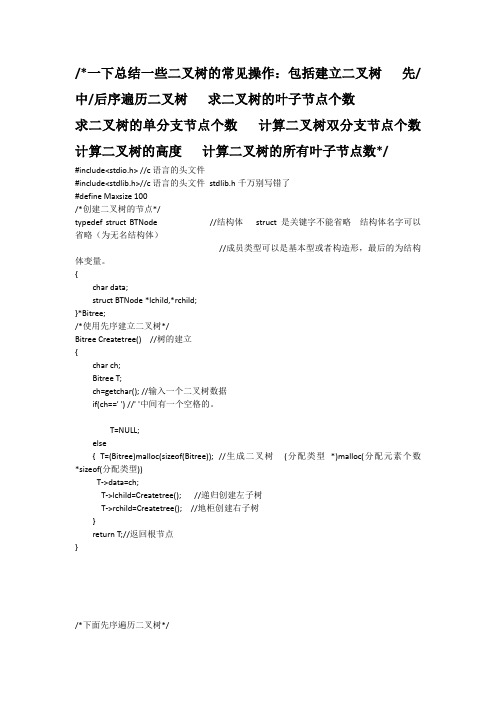
/*一下总结一些二叉树的常见操作:包括建立二叉树先/中/后序遍历二叉树求二叉树的叶子节点个数求二叉树的单分支节点个数计算二叉树双分支节点个数计算二叉树的高度计算二叉树的所有叶子节点数*/#include<stdio.h> //c语言的头文件#include<stdlib.h>//c语言的头文件stdlib.h千万别写错了#define Maxsize 100/*创建二叉树的节点*/typedef struct BTNode //结构体struct 是关键字不能省略结构体名字可以省略(为无名结构体)//成员类型可以是基本型或者构造形,最后的为结构体变量。
{char data;struct BTNode *lchild,*rchild;}*Bitree;/*使用先序建立二叉树*/Bitree Createtree() //树的建立{char ch;Bitree T;ch=getchar(); //输入一个二叉树数据if(ch==' ') //' '中间有一个空格的。
T=NULL;else{ T=(Bitree)malloc(sizeof(Bitree)); //生成二叉树(分配类型*)malloc(分配元素个数*sizeof(分配类型))T->data=ch;T->lchild=Createtree(); //递归创建左子树T->rchild=Createtree(); //地柜创建右子树}return T;//返回根节点}/*下面先序遍历二叉树*//*void preorder(Bitree T) //先序遍历{if(T){printf("%c-",T->data);preorder(T->lchild);preorder(T->rchild);}} *//*下面先序遍历二叉树非递归算法设计*/void preorder(Bitree T) //先序遍历非递归算法设计{Bitree st[Maxsize];//定义循环队列存放节点的指针Bitree p;int top=-1; //栈置空if(T){top++;st[top]=T; //根节点进栈while(top>-1) //栈不空时循环{p=st[top]; //栈顶指针出栈top--;printf("%c-",p->data );if(p->rchild !=NULL) //右孩子存在进栈{top++;st[top]=p->rchild ;}if(p->lchild !=NULL) //左孩子存在进栈{top++;st[top]=p->lchild ;}}printf("\n");}}/*下面中序遍历二叉树*//*void inorder(Bitree T) //中序遍历{if(T){inorder(T->lchild);printf("%c-",T->data);inorder(T->rchild);}}*//*下面中序遍历二叉树非递归算法设计*/void inorder(Bitree T) //中序遍历{Bitree st[Maxsize]; //定义循环队列,存放节点的指针Bitree p;int top=-1;if(T){p=T;while (top>-1||p!=NULL) //栈不空或者*不空是循环{while(p!=NULL) //扫描*p的所有左孩子并进栈{top++;st[top]=p;p=p->lchild ;}if(top>-1){p=st[top]; //出栈*p节点,它没有右孩子或右孩子已被访问。
数据结构实验五(二叉树的建立及遍历)题目和源程序
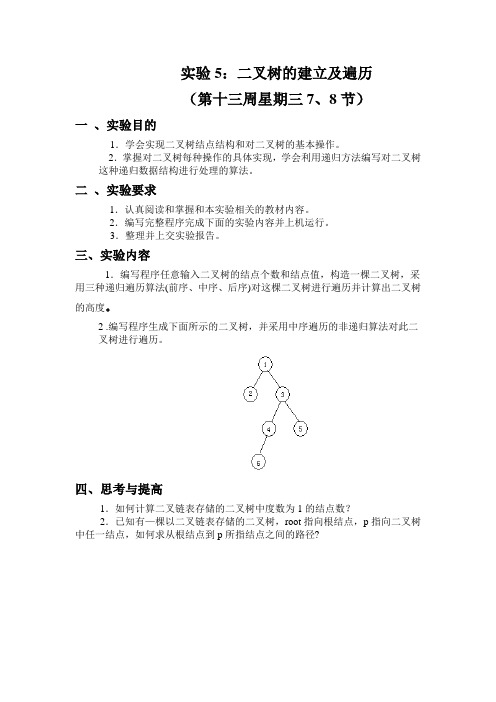
实验5:二叉树的建立及遍历(第十三周星期三7、8节)一、实验目的1.学会实现二叉树结点结构和对二叉树的基本操作。
2.掌握对二叉树每种操作的具体实现,学会利用递归方法编写对二叉树这种递归数据结构进行处理的算法。
二、实验要求1.认真阅读和掌握和本实验相关的教材内容。
2.编写完整程序完成下面的实验内容并上机运行。
3.整理并上交实验报告。
三、实验内容1.编写程序任意输入二叉树的结点个数和结点值,构造一棵二叉树,采用三种递归遍历算法(前序、中序、后序)对这棵二叉树进行遍历并计算出二叉树的高度。
2 .编写程序生成下面所示的二叉树,并采用中序遍历的非递归算法对此二叉树进行遍历。
四、思考与提高1.如何计算二叉链表存储的二叉树中度数为1的结点数?2.已知有—棵以二叉链表存储的二叉树,root指向根结点,p指向二叉树中任一结点,如何求从根结点到p所指结点之间的路径?/*----------------------------------------* 05-1_递归遍历二叉树.cpp -- 递归遍历二叉树的相关操作* 对递归遍历二叉树的每个基本操作都用单独的函数来实现* 水上飘2009年写----------------------------------------*/// ds05.cpp : Defines the entry point for the console application.//#include "stdafx.h"#include <iostream>typedef char ElemType;using namespace std;typedef struct BiTNode {ElemType data;//左右孩子指针BiTNode *lchild, *rchild;}BiTNode, *BiTree;//动态输入字符按先序创建二叉树void CreateBiTree(BiTree &T) {char ch;ch = cin.get();if(ch == ' ') {T = NULL;}else {if(ch == '\n') {cout << "输入未结束前不要输入回车,""要结束分支请输入空格!" << endl;}else {//生成根结点T = (BiTNode * )malloc(sizeof(BiTNode));if(!T)cout << "内存分配失败!" << endl;T->data = ch;//构造左子树CreateBiTree(T->lchild);//构造右子树CreateBiTree(T->rchild);}}}//输出e的值ElemType PrintElement(ElemType e) { cout << e << " ";return e;}//先序遍历void PreOrderTraverse(BiTree T) { if (T != NULL) {//打印结点的值PrintElement(T->data);//遍历左孩子PreOrderTraverse(T->lchild);//遍历右孩子PreOrderTraverse(T->rchild);}}//中序遍历void InOrderTraverse(BiTree T) {if (T != NULL) {//遍历左孩子InOrderTraverse(T->lchild);//打印结点的值PrintElement(T->data);//遍历右孩子InOrderTraverse(T->rchild);}}//后序遍历void PostOrderTraverse(BiTree T) { if (T != NULL) {//遍历左孩子PostOrderTraverse(T->lchild);//遍历右孩子PostOrderTraverse(T->rchild);//打印结点的值PrintElement(T->data);}}//按任一种遍历次序输出二叉树中的所有结点void TraverseBiTree(BiTree T, int mark) {if(mark == 1) {//先序遍历PreOrderTraverse(T);cout << endl;}else if(mark == 2) {//中序遍历InOrderTraverse(T);cout << endl;}else if(mark == 3) {//后序遍历PostOrderTraverse(T);cout << endl;}else cout << "选择遍历结束!" << endl;}//输入值并执行选择遍历函数void ChoiceMark(BiTree T) {int mark = 1;cout << "请输入,先序遍历为1,中序为2,后序为3,跳过此操作为0:";cin >> mark;if(mark > 0 && mark < 4) {TraverseBiTree(T, mark);ChoiceMark(T);}else cout << "此操作已跳过!" << endl;}//求二叉树的深度int BiTreeDepth(BiTNode *T) {if (T == NULL) {//对于空树,返回0并结束递归return 0;}else {//计算左子树的深度int dep1 = BiTreeDepth(T->lchild);//计算右子树的深度int dep2 = BiTreeDepth(T->rchild);//返回树的深度if(dep1 > dep2)return dep1 + 1;elsereturn dep2 + 1;}}int _tmain(int argc, _TCHAR* argv[]){BiTNode *bt;bt = NULL; //将树根指针置空cout << "输入规则:" << endl<< "要生成新结点,输入一个字符,""不要生成新结点的左孩子,输入一个空格,""左右孩子都不要,输入两个空格,""要结束,输入多个空格(越多越好),再回车!"<< endl << "按先序输入:";CreateBiTree(bt);cout << "树的深度为:" << BiTreeDepth(bt) << endl;ChoiceMark(bt);return 0;}/*----------------------------------------* 05-2_构造二叉树.cpp -- 构造二叉树的相关操作* 对构造二叉树的每个基本操作都用单独的函数来实现* 水上飘2009年写----------------------------------------*/// ds05-2.cpp : Defines the entry point for the console application.//#include "stdafx.h"#include <iostream>#define STACK_INIT_SIZE 100 //栈的存储空间初始分配量#define STACKINCREMENT 10 //存储空间分配增量typedef char ElemType; //元素类型using namespace std;typedef struct BiTNode {ElemType data; //结点值BiTNode *lchild, *rchild; //左右孩子指针}BiTNode, *BiTree;typedef struct {BiTree *base; //在栈构造之前和销毁之后,base的值为空BiTree *top; //栈顶指针int stacksize; //当前已分配的存储空间,以元素为单位}SqStack;//构造一个空栈void InitStack(SqStack &s) {s.base = (BiTree *)malloc(STACK_INIT_SIZE * sizeof(BiTree));if(!s.base)cout << "存储分配失败!" << endl;s.top = s.base;s.stacksize = STACK_INIT_SIZE;}//插入元素e为新的栈顶元素void Push(SqStack &s, BiTree e) {//栈满,追加存储空间if ((s.top - s.base) >= s.stacksize) {s.base = (BiTree *)malloc((STACK_INIT_SIZE+STACKINCREMENT) * sizeof(BiTree));if(!s.base)cout << "存储分配失败!" << endl;s.top = s.base + s.stacksize;s.stacksize += STACK_INIT_SIZE;}*s.top++ = e;}//若栈不空,则删除s的栈顶元素,并返回其值BiTree Pop(SqStack &s) {if(s.top == s.base)cout << "栈为空,无法删除栈顶元素!" << endl;s.top--;return *s.top;}//按先序输入字符创建二叉树void CreateBiTree(BiTree &T) {char ch;//接受输入的字符ch = cin.get();if(ch == ' ') {//分支结束T = NULL;} //if' 'endelse if(ch == '\n') {cout << "输入未结束前不要输入回车,""要结束分支请输入空格!(接着输入)" << endl;} //if'\n'endelse {//生成根结点T = (BiTNode * )malloc(sizeof(BiTree));if(!T)cout << "内存分配失败!" << endl;T->data = ch;//构造左子树CreateBiTree(T->lchild);//构造右子树CreateBiTree(T->rchild);} //Create end}//输出e的值,并返回ElemType PrintElement(ElemType e) {cout << e << " ";return e;}//中序遍历二叉树的非递归函数void InOrderTraverse(BiTree p, SqStack &S) {cout << "中序遍历结果:";while(S.top != S.base || p != NULL) {if(p != NULL) {Push(S,p);p = p->lchild;} //if NULL endelse {BiTree bi = Pop(S);if(!PrintElement(bi->data))cout << "输出其值未成功!" << endl;p = bi->rchild;} //else end} //while endcout << endl;}int _tmain(int argc, _TCHAR* argv[]){BiTNode *bt;SqStack S;InitStack(S);bt = NULL; //将树根指针置空cout << "老师要求的二叉树序列(‘空’表示空格):""12空空346空空空5空空,再回车!"<< endl << "请按先序输入一个二叉树序列(可另输入,但要为先序),""无左右孩子则分别输入空格。
实验8 线索二叉树的创建和遍历
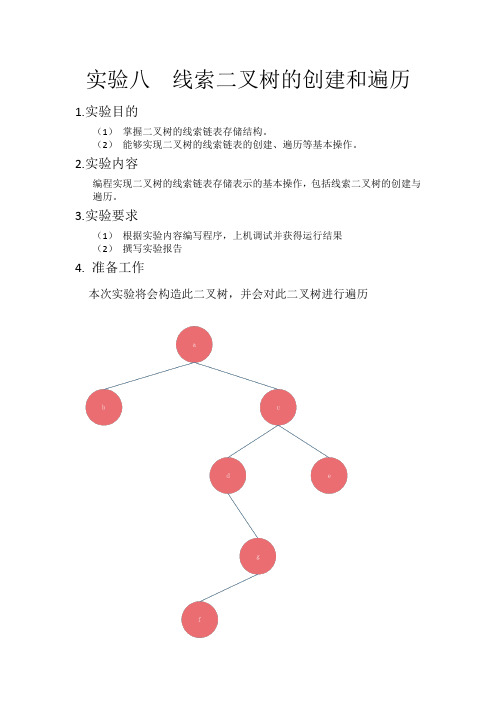
实验八线索二叉树的创建和遍历1.实验目的(1)掌握二叉树的线索链表存储结构。
(2)能够实现二叉树的线索链表的创建、遍历等基本操作。
2.实验内容编程实现二叉树的线索链表存储表示的基本操作,包括线索二叉树的创建与遍历。
3.实验要求(1)根据实验内容编写程序,上机调试并获得运行结果(2)撰写实验报告4.准备工作本次实验将会构造此二叉树,并会对此二叉树进行遍历5.关键步骤与算法(1)构造线索二叉树算法步骤;若某节点的左孩子节点指针域(lchild)为空,就可以利用它来指出该节点在某种遍历序列中的直接前驱的存储地址;若某节点的右孩子指针域(rchild)为空,就可以利用它来指出该节点在某种遍历序列中的直接后继的存储地址。
那些非空的指针域仍存放指向该节点左、右孩子节点的指针域。
这样,就得到了一棵线索二叉树。
算法如下;1.//按先序遍历序列输入树中各节点的值,构造线索二叉树2.BiThrTree* CreateBiThrTree()3.{4. BiThrTree *s;5. DataType ch;6. scanf("%c",&ch);7.8.if(ch == '#')9. exit(0);10.if(ch == '@')11. s = NULL;12.else if (ch=='\n')13. getchar();14.15.else16. {17. s = (BiThrTree *)malloc(sizeof(BiThrTree));18.if(!s)19. exit(ERROR);20. s->data = ch;21. s->lflag = 0;22. s->rflag = 0;23. s->lchild = CreateBiThrTree();24. s->rchild = CreateBiThrTree();25. }26.return s;27.}(2) 将二叉树中序线索化现将树递归到左子树然后再判断这个树的左右子树是否为空,如果为空则把它们的标志设为1,代表线索,首先设一个current代表前驱结点,然后判断它是否为空,如果为空则进行下一次递归,如果不为空,则判断左标志和右标志如果左标志为线索,则让前驱节点的右孩子指向当前节点,如果右标志为1,则让当前节点的左孩子指向前驱结点算法如下;1.void InThreading(BiThrTree *t)2.{3.if(t != NULL)//先判断树为不为空,如果为空,则不执行函数4. {5. InThreading(t->lchild);//递归调用左子树进行线索化6.if(t->lchild == NULL)7. t->lflag = 1;8.if(t->rchild == NULL)9. t->rflag = 1;10.//以上两步是判断这个结点的左右结点是否为空,若为空,把他们对应的flag标上111.if(current != NULL)//因为要用到current所以要判断一下,且current只有当t回到倒数第二个结点时,才会不为NULL12. {13.if(current->rflag == 1)14. current->rchild = t;//前驱结点的右孩子指针指向当前节点t15.if(t->lflag == 1)16. t->lchild = current;//现结点t的左孩子指针指向前驱结点17. }18. current = t;//让前驱结点为t为下一次执行函数做准备19. InThreading(t->rchild);//递归调用右子树进行线索化20. }21.}6.源代码1.#include<malloc.h>2.#include<stdio.h>3.#include<stdlib.h>4.#include<io.h>5.#define ERROR -16.7.typedef char DataType;8.typedef struct BiThrNode//二叉树的二叉链表的存储结构9.{10. DataType data;11.struct BiThrNode *lchild,*rchild;12.int lflag,rflag;//左右标志,值为0表示指针,值为1表示线索13.}BiThrTree;14.BiThrTree *current = NULL;15.//检查if的==16.//按先序遍历序列输入树中各节点的值,构造线索二叉树17.BiThrTree* CreateBiThrTree()18.{19. BiThrTree *s;20. DataType ch;21. scanf("%c",&ch);22.23.if(ch == '#')24. exit(0);25.if(ch == '@')26. s = NULL;27.else if (ch=='\n')28. getchar();29.30.else31. {32. s = (BiThrTree *)malloc(sizeof(BiThrTree));33.if(!s)34. exit(ERROR);35. s->data = ch;36. s->lflag = 0;37. s->rflag = 0;38. s->lchild = CreateBiThrTree();39. s->rchild = CreateBiThrTree();40. }41.return s;42.}43.//将二叉树前序线索化(递归)44.void PreThreading(BiThrTree *t)45.{46.if(t != NULL)//先判断树为不为空,如果为空,则不执行函数47. {48.if(t->lchild == NULL)49. t->lflag = 1;50.if(t->rchild == NULL)51. t->rflag = 1;52.//以上两步是判断这个结点的左右结点是否为空,若为空,把他们对应的flag标上153.if(current != NULL)//因为要用到current所以要判断一下,且current只有当t回到倒数第二个结点时,才会不为NULL54. {55.if(current->rflag == 1)56. current->rchild = t;//前驱结点的右孩子指针指向当前节点t57.if(t->lflag == 1)58. t->lchild = current;//现结点t的左孩子指针指向前驱结点59. }60. current = t;//让前驱结点为t为下一次执行函数做准备61.if(t->lflag == 0)62. PreThreading(t->lchild);//递归调用右子树进行线索化63.if(t->rflag == 0)64. PreThreading(t->rchild);65. }66.}67.//遍历前序线索二叉树68.void PreVisitThrtree(BiThrTree *t)69.{70.while(t != NULL)//大循环71. {72.while(t->lflag == 0)73. {74. printf("%c\t",t->data);75. t = t->lchild;76. }77. printf("%c\t",t->data);78. t = t->rchild;79. }80.}81.82.//检查if的==83.//将二叉树中序线索化(递归)84.void InThreading(BiThrTree *t)85.{86.if(t != NULL)//先判断树为不为空,如果为空,则不执行函数87. {88. InThreading(t->lchild);//递归调用左子树进行线索化89.if(t->lchild == NULL)90. t->lflag = 1;91.if(t->rchild == NULL)92. t->rflag = 1;93.//以上两步是判断这个结点的左右结点是否为空,若为空,把他们对应的flag标上194.if(current != NULL)//因为要用到current所以要判断一下,且current只有当t回到倒数第二个结点时,才会不为NULL95. {96.if(current->rflag == 1)97. current->rchild = t;//前驱结点的右孩子指针指向当前节点t98.if(t->lflag == 1)99. t->lchild = current;//现结点t的左孩子指针指向前驱结点100. }101. current = t;//让前驱结点为t为下一次执行函数做准备102. InThreading(t->rchild);//递归调用右子树进行线索化103. }104.}105.//检查if的==106.//遍历中序线索二叉树107.void InVisitThrtree(BiThrTree *t)108.{109.while(t != NULL)//大循环110. {111.while(t->lflag == 0)//小循环1;此循环第一次进行时首先要去找到最左节点112. t = t->lchild;113.if(t == NULL)114. exit(ERROR);115. printf("%c\t",t->data);116.while(t->rflag == 1 && t->rchild != NULL)//小循环2117. {118. t = t->rchild;119. printf("%c\t",t->data);120. }121. t = t->rchild;122./*123.两种情况:124. 1.如果t的右子树为空则t直接指向t的中序后继结点.125. 2.如果t的右子树不为空,即t->rflag为0,那么退出这个小循环2回到大循环中,再到小循环1中去找t的右子树的最左下的结点.126. */127. }128.}129.130.//将二叉树后序线索化(递归)131.void PostThreading(BiThrTree *t)132.{133.if(t != NULL)//先判断树为不为空,如果为空,则不执行函数134. {135. PreThreading(t->lchild);136. PreThreading(t->rchild);137.if(t->lchild == NULL)138. t->lflag = 1;139.if(t->rchild == NULL)140. t->rflag = 1;141.//以上两步是判断这个结点的左右结点是否为空,若为空,把他们对应的flag标上1142.if(current != NULL)//因为要用到current所以要判断一下,且current只有当t回到倒数第二个结点时,才会不为NULL143. {144.if(current->rflag == 1)145. current->rchild = t;//前驱结点的右孩子指针指向当前节点t146.if(t->lflag == 1)147. t->lchild = current;//现结点t的左孩子指针指向前驱结点148. }149. current = t;//让前驱结点为t为下一次执行函数做准备150. }151.}152.//遍历后序线索二叉树153.void PostVisitThrtree(BiThrTree *t)154.{155.if(t)156. {157.while(t->lchild != NULL && t->lflag == 0)158. {159. t = t->lchild;//先遍历到最左边的节点160. }161. }162.}163.//主函数164.void main()165.{166. BiThrTree *t,*s;167. printf("\t\t请按先序序列输入二叉树(如:ABC@@DE@G@@F@@@#)\n\t\t");168. t = CreateBiThrTree();169. InThreading(t);170. printf("\t\t按中序遍历输出线索二叉树:\n\t\t");171. InVisitThrtree(t);172. printf("\n");173.//getchar();174.//getchar();175. fflush(stdin);//这个操作必须要进行,或者是进行上面注释的那两步操作,要不然176. printf("\t\t请按先序序列输入二叉树(如:ABC@@DE@G@@F@@@#)\n\t\t");177. s = CreateBiThrTree();178. PreThreading(s);179. printf("\t\t按前序遍历输出线索二叉树:\n\t\t");180. PreVisitThrtree(s);181.}7.测试图8.实验总结然对于这一节,主要是讨论线索二叉树的建立以及遍历,对于二叉树的建立,主要有五个部分构成,分别是data,lchild,rchild,lflag,rflag,而它与二叉树不同的地方就是多了lflag和rflag的判断,当当前节点的左节点为空时一定会指向它的前驱结点,当前驱节点的右节点为空时,让前驱结点的右指针域指向当前节点,这就是线索化,而对于前序中序后序的线索化本质都是一样的。
数据结构入门-树的遍历以及二叉树的创建

数据结构⼊门-树的遍历以及⼆叉树的创建树定义:1. 有且只有⼀个称为根的节点2. 有若⼲个互不相交的⼦树,这些⼦树本⾝也是⼀个树通俗的讲:1. 树是有结点和边组成,2. 每个结点只有⼀个⽗结点,但可以有多个⼦节点3. 但有⼀个节点例外,该节点没有⽗结点,称为根节点⼀、专业术语结点、⽗结点、⼦结点、根结点深度:从根节点到最底层结点的层数称为深度,根节点第⼀层叶⼦结点:没有⼦结点的结点⾮终端节点:实际上是⾮叶⼦结点度:⼦结点的个数成为度⼆、树的分类⼀般树:任意⼀个结点的⼦结点的个数都不受限制⼆叉树:任意⼀个结点的⼦结点个数最多是两个,且⼦结点的位置不可更改⼆叉数分类:1. ⼀般⼆叉数2. 满⼆叉树:在不增加树层数的前提下,⽆法再多添加⼀个结点的⼆叉树3. 完全⼆叉树:如果只是删除了满⼆叉树最底层最右边的连续若⼲个结点,这样形成的⼆叉树就是完全⼆叉树森林:n个互不相交的树的集合三、树的存储⼆叉树存储连续存储(完全⼆叉树)优点:查找某个结点的⽗结点和⼦结点(也包括判断有没有⼦结点)速度很快缺点:耗⽤内存空间过⼤链式存储⼀般树存储1. 双亲表⽰法:求⽗结点⽅便2. 孩⼦表⽰法:求⼦结点⽅便3. 双亲孩⼦表⽰法:求⽗结点和⼦结点都很⽅便4. ⼆叉树表⽰法:把⼀个⼀般树转化成⼀个⼆叉树来存储,具体转换⽅法:设法保证任意⼀个结点的左指针域指向它的第⼀个孩⼦,右指针域指向它的兄弟,只要能满⾜此条件,就可以把⼀个⼀般树转化为⼆叉树⼀个普通树转换成的⼆叉树⼀定没有右⼦树森林的存储先把森林转化为⼆叉树,再存储⼆叉树四、树的遍历先序遍历:根左右先访问根结点,再先序访问左⼦树,再先序访问右⼦树中序遍历:左根右中序遍历左⼦树,再访问根结点,再中序遍历右⼦树后续遍历:左右根后续遍历左⼦树,后续遍历右⼦树,再访问根节点五、已知两种遍历求原始⼆叉树给定了⼆叉树的任何⼀种遍历序列,都⽆法唯⼀确定相应的⼆叉树,但是如果知道了⼆叉树的中序遍历序列和任意的另⼀种遍历序列,就可以唯⼀地确定⼆叉树已知先序和中序求后序先序:ABCDEFGH中序:BDCEAFHG求后序:这个⾃⼰画个图体会⼀下就可以了,⾮常简单,这⾥简单记录⼀下1. ⾸先根据先序确定根,上⾯的A就是根2. 中序确定左右,A左边就是左树(BDCE),A右边就是右树(FHG)3. 再根据先序,A左下⾯就是B,然后根据中序,B左边没有,右边是DCE4. 再根据先序,B右下是C,根据中序,c左下边是D,右下边是E,所以整个左树就确定了5. 右树,根据先序,A右下是F,然后根据中序,F的左下没有,右下是HG,6. 根据先序,F右下为G,然后根据中序,H在G的左边,所以G的左下边是H再来⼀个例⼦,和上⾯的思路是⼀样的,这⾥就不详细的写了先序:ABDGHCEFI中序:GDHBAECIF已知中序和后序求先序中序:BDCEAFHG后序:DECBHGFA这个和上⾯的思路是⼀样的,只不过是反过来找,后序找根,中序找左右树简单应⽤树是数据库中数据组织⼀种重要形式操作系统⼦⽗进程的关系本⾝就是⼀棵树⾯向对象语⾔中类的继承关系哈夫曼树六、⼆叉树的创建#include <stdio.h>#include <stdlib.h>typedef struct Node{char data;struct Node * lchild;struct Node * rchild;}BTNode;/*⼆叉树建⽴*/void BuildBT(BTNode ** tree){char ch;scanf("%c" , &ch); // 输⼊数据if(ch == '#') // 如果这个节点的数据是#说明这个结点为空*tree = NULL;else{*tree = (BTNode*)malloc(sizeof(BTNode));//申请⼀个结点的内存 (*tree)->data = ch; // 将数据写⼊到结点⾥⾯BuildBT(&(*tree)->lchild); // 递归建⽴左⼦树BuildBT(&(*tree)->rchild); // 递归建⽴右⼦树}}/*⼆叉树销毁*/void DestroyBT(BTNode *tree) // 传⼊根结点{if(tree != NULL){DestroyBT(tree->lchild);DestroyBT(tree->rchild);free(tree); // 释放内存空间}}/*⼆叉树的先序遍历*/void Preorder(BTNode * node){if(node == NULL)return;else{printf("%c ",node->data );Preorder(node->lchild);Preorder(node->rchild);}}/*⼆叉树的中序遍历*/void Inorder(BTNode * node){if(node == NULL)return;else{Inorder(node->lchild);printf("%c ",node->data );Inorder(node->rchild);}}/*⼆叉树的后序遍历*/void Postorder(BTNode * node){if(node == NULL)return;else{Postorder(node->lchild);Postorder(node->rchild);printf("%c ",node->data );}}/*⼆叉树的⾼度树的⾼度 = max(左⼦树⾼度,右⼦树⾼度) +1*/int getHeight(BTNode *node){int Height = 0;if (node == NULL)return 0;else{int L_height = getHeight(node->lchild);int R_height = getHeight(node->rchild);Height = L_height >= R_height ? L_height +1 : R_height +1; }return Height;}int main(int argc, char const *argv[]){BTNode * BTree; // 定义⼀个⼆叉树printf("请输⼊⼀颗⼆叉树先序序列以#表⽰空结点:");BuildBT(&BTree);printf("先序序列:");Preorder(BTree);printf("\n中序序列:");Inorder(BTree);printf("\n后序序列:");Postorder(BTree);printf("\n树的⾼度为:%d" , getHeight(BTree));return 0;}// ABC##DE##F##G##。
线索二叉树的创建及遍历
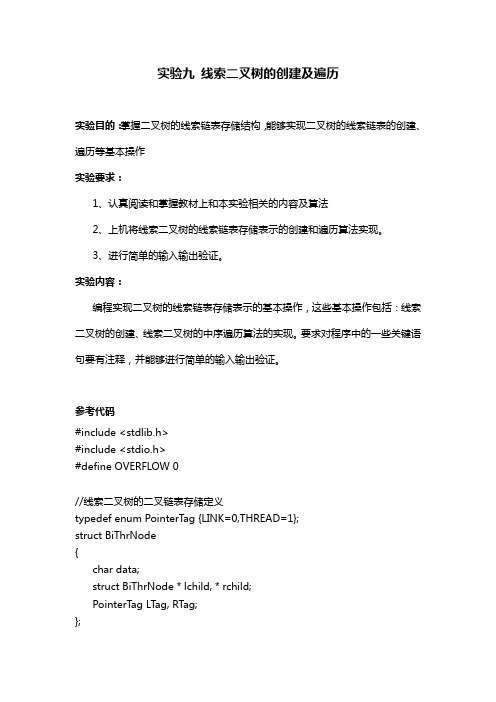
实验九线索二叉树的创建及遍历实验目的:掌握二叉树的线索链表存储结构,能够实现二叉树的线索链表的创建、遍历等基本操作实验要求:1、认真阅读和掌握教材上和本实验相关的内容及算法2、上机将线索二叉树的线索链表存储表示的创建和遍历算法实现。
3、进行简单的输入输出验证。
实验内容:编程实现二叉树的线索链表存储表示的基本操作,这些基本操作包括:线索二叉树的创建、线索二叉树的中序遍历算法的实现。
要求对程序中的一些关键语句要有注释,并能够进行简单的输入输出验证。
参考代码#include <stdlib.h>#include <stdio.h>#define OVERFLOW 0//线索二叉树的二叉链表存储定义typedef enum PointerTag {LINK=0,THREAD=1};struct BiThrNode{char data;struct BiThrNode * lchild, * rchild;PointerTag LTag, RTag;};typedef struct BiThrNode BiThrNode;typedef BiThrNode * BiThrTree;/*****************************************************************\** 按先序次序输入二叉树中的结点的值(一个字符)构造二叉链表表示的二叉树,* 字符'#'表示空树。
** 例如,一棵二叉树的三种遍历次序为:* 先序:-+a*b-cd/ef 中序:a+b*c-d-e/f 后序:abcd-*+ef/* 程序中应该输入:-+a##*b##-c##d##/e##f##** 又如,一棵二叉树的三种遍历次序为:* 先序:ABDFGCEH 中序:BFDGACHE 后序:FGDBHECA* 程序中应该输入:AB#DF##G##C#EH###*\******************************************************************/ void CreateBiTree(BiThrTree &T){char ch;ch = getchar();if (ch=='#') T=NULL;else{if (!(T = (BiThrNode *)malloc(sizeof(BiThrNode)))) exit(OVERFLOW);T->data = ch;T->LTag = LINK;T->RTag = LINK;CreateBiTree(T->lchild);CreateBiTree(T->rchild);}return;}//CreateBiTreevoid PrintBiTree(BiThrTree T){//按中序遍历次序输出二叉树T中的结点的值(一个字符),二叉树T用二叉链表存储。
二叉树的建立、遍历、叶子节点计数、深度计算

⼆叉树的建⽴、遍历、叶⼦节点计数、深度计算⼆叉树的建⽴有三中⽅式:先序遍历建树,中序遍历建树,后序遍历建树⼆叉树的遍历⽅式也有三种:先序遍历,中序遍历,后序遍历另外还可以计算⼆叉树的深度,计算⼆叉树的叶⼦结点数遍历倒是没有什么问题,但是我刚开始建树的时候总是出现问题;先定义⼀个树节点,然后把这个树节点传进建树的函数中进⾏建树,这样的话建树的函数必须把树根的地址返回给建树之前定义的那个节点总之就是:建树的函数必须能够把所建⽴的树的地址传回去(不管⽤什么传递⽅式);下⾯粘贴两个代码(建树⽅式都是先序);sampleinputABD*F***CE***输出先序遍历结果ABDFCE中序遍历结果DFBAEC后序遍历结果FDBECA树的深度为4叶节点个数为2代码⼀:#include <string.h>#include <stdlib.h>#include <stdio.h>#include <malloc.h>#include <iostream>using namespace std;struct Node{char data;struct Node *l, *r;};int sum = 0;struct Node *Creat(struct Node *p){char q;scanf("%c", &q);if(q == '*')p = NULL;else{p = (struct Node *)malloc(sizeof(struct Node));p->data = q;p->l = Creat(p->l);p->r = Creat(p->r);}return p;}int Xianxu(struct Node *p){if(p){printf("%c", p->data);Xianxu(p->l);Xianxu(p->r);}return0;}int Zhongxu(struct Node *p){if(p){Zhongxu(p->l);printf("%c", p->data);Zhongxu(p->r);}return0;}int Houxu(struct Node *p){if(p){Houxu(p->l);Houxu(p->r);printf("%c", p->data);}return0;}int Deep(struct Node *p){int c1, c2;if(!p)return0;c1 = Deep(p->l);c2 = Deep(p->r);return c1 > c2 ? c1+1 : c2+1;}int Jiedian(struct Node *p){if(p){Jiedian(p->l);Jiedian(p->r);if((p->l == NULL) && (p->r == NULL))sum++;}return sum;}int main(){int sum;struct Node *head;head = (struct Node *)malloc(sizeof(struct Node));head = Creat(head);printf("先序遍历结果\n");Xianxu(head);printf("\n");printf("中序遍历结果\n");Zhongxu(head);printf("\n");printf("后序遍历结果\n");Houxu(head);printf("\n");printf("树的深度为%d\n", Deep(head));sum = Jiedian(head);printf("叶节点个数为%d\n", sum);return0;}代码⼆:/*⼆叉树的⼆叉链表的存储⽅式注意⼆叉树也有三叉链表的存储⽅式,这种存储⽅式记录左右⼦树的根以及双亲节点的地址但是⼆叉树的三叉链表存储⽅式存储有n个节点的树会产⽣n+1个空的链域遍历是⼆叉树最基本的操作,对某个节点的改动可以通过遍历来实现,检索某个节点也可以通过遍历来实现*/#include <windows.h>#include <stdio.h>#include <string.h>#include <iostream>int i = 0;using namespace std;typedef struct TreeNode //定义树上的每⼀个节点{char data;struct TreeNode *lchild, *rchild;}TreeNode;int Preorder(struct TreeNode *p); //先序遍历void Inorder(struct TreeNode *p); //中根遍历void Posorder(struct TreeNode *p); //后根遍历void CreatBiTree(TreeNode &p); // 建⽴⼆叉树int Preorder(struct TreeNode *p)//先序遍历{if(p){cout << p->data;Preorder(p->lchild);Preorder(p->rchild);}return0;}void Inorder(struct TreeNode *p) //中根遍历{if(p){Inorder(p->lchild);cout << p->data;Inorder(p->rchild);}}void Posorder(struct TreeNode *p)//后根遍历{if(p){Posorder(p->lchild);Posorder(p->rchild);cout << p->data;}}char Getonech(char ar[]){return ar[i++];}TreeNode* CreatBiTree(TreeNode *p) //建⽴⼆叉树{char ch;scanf("%c", &ch);if(ch != '*'){p = new TreeNode;p->data = ch;p->lchild = CreatBiTree(p->lchild);p->rchild = CreatBiTree(p->rchild);}elsep = NULL;return p;}TreeNode* CreatBiTree(TreeNode *p, char ar[]){char ch;ch = Getonech(ar);if(ch != '*'){p = new TreeNode;p->data = ch;p->lchild = CreatBiTree(p->lchild, ar);p->rchild = CreatBiTree(p->rchild, ar);}elsep = NULL;return p;}int main(){//第⼀种建树⽅式(⽤已经定义的字符串建树) char s[19] = "ABD*F***CE***";TreeNode *tree = new TreeNode;tree = CreatBiTree(tree, s);printf("先序遍历结果\n");Preorder(tree);printf("\n");printf("中序遍历结果\n");Inorder(tree);printf("\n");printf("后序遍历结果\n");Posorder(tree);printf("\n");//第⼆种建树⽅式(输⼊树)TreeNode *tree1 = new TreeNode; tree1 = CreatBiTree(tree1);printf("先序遍历结果\n");Preorder(tree1);printf("\n");system("pause");printf("中序遍历结果\n");Inorder(tree1);system("pause");printf("\n");printf("后序遍历结果\n");Posorder(tree1);system("pause");printf("\n");return0;}。
设计以先序遍历的顺序建立二叉树的二叉链表存储结构的算法

设计以先序遍历的顺序建立二叉树的二叉链表存储结构的算法一、算法简介二叉树是一种重要的树形结构,它的建立方式有多种,其中一种是按照先序遍历的顺序建立二叉树。
这种方式需要将先序遍历序列和二叉树的存储结构相结合,采用二叉链表存储结构。
具体流程是按照先序遍历序列的顺序依次创建二叉树的各个节点,同时使用二叉链表结构保存每个节点的数据和指针信息。
二、算法实现算法的实现主要包括初始化二叉树、创建节点、建立二叉树等步骤,下面对这些步骤进行详细描述。
1. 初始化二叉树初始化二叉树需要创建一个根节点,同时将根节点的左右指针指向NULL,表示二叉树为空。
2. 创建节点创建节点需要通过输入元素数据来创建,同时节点的左右指针也需要初始化为NULL。
3. 建立二叉树建立二叉树是按照先序遍历序列来实现的,具体流程如下:(1)读入当前节点的元素数据,创建节点,并将其作为当前节点。
(2)判断当前节点的元素数据是否为结束符号(这里结束符号可以指定),如果是,则返回NULL。
(3)递归创建当前节点的左子树,将左子树的根节点赋值给当前节点的左指针。
(4)递归创建当前节点的右子树,将右子树的根节点赋值给当前节点的右指针。
(5)返回当前节点。
三、算法优化虽然上述算法实现简单明了,但它有一个缺点,即无法处理空节点的情况,如果输入的先序遍历序列中存在空节点,那么该算法就无法建立正确的二叉树了。
因此,可以在输入的先序遍历序列中使用一个特殊的符号(如#)表示空节点,在建立节点时,如果遇到该符号,则将该节点的指针设置为NULL即可。
四、算法总结按照先序遍历的顺序建立二叉树是一种基于二叉链表存储结构的建树方式。
它通过递归的方式构建整个二叉树,同时为了处理空节点的情况,还需要对输入的先序遍历序列进行特殊处理。
该算法的效率较高,适用于对先序遍历序列已知的情况下建立二叉树。
二叉树的遍历PPT-课件
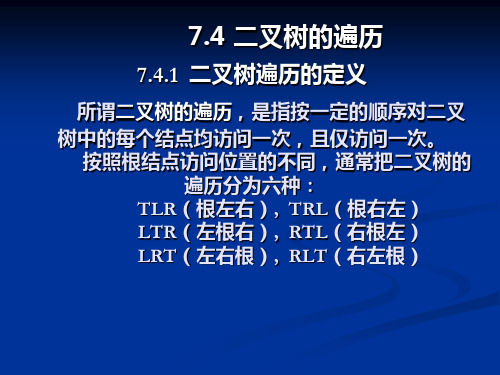
4 、二叉树的创建算法
利用二叉树前序遍历的结果可以非常方便地生成给定的
二叉树,具体做法是:将第一个输入的结点作为二叉树的 根结点,后继输入的结点序列是二叉树左子树前序遍历的 结果,由它们生成二叉树的左子树;再接下来输入的结点 序列为二叉树右子树前序遍历的结果,应该由它们生成二 叉树的右子树;而由二叉树左子树前序遍历的结果生成二 叉树的左子树和由二叉树右子树前序遍历的结果生成二叉 树的右子树的过程均与由整棵二叉树的前序遍历结果生成 该二叉树的过程完全相同,只是所处理的对象范围不同, 于是完全可以使用递归方式加以实现。
void createbintree(bintree *t) { char ch; if ((ch=getchar())==' ') *t=NULL; else { *t=(bintnode *)malloc(sizeof(bintnode)); /*生成二叉树的根结点*/ (*t)->data=ch; createbintree(&(*t)->lchild); /*递归实现左子树的建立*/ createbintree(&(*t)->rchild); /*递归实现右子树的建立*/ }
if (s.top>-1) { t=s.data[s.top]; s.tag[s.top]=1; t=t->rchild; }
else t=NULL; }
}
7.5 二叉树其它运算的实现
由于二叉树本身的定义是递归的,因此关于二叉树的许多 问题或运算采用递归方式实现非常地简单和自然。 1、二叉树的查找locate(t,x)
(1)对一棵二叉树中序遍历时,若我们将二叉树严
格地按左子树的所有结点位于根结点的左侧,右子树的所
二叉树遍历稿ppt课件

若已知先序(或后序)遍历结果和中序遍历结 果,能否“恢复”出二叉树?
例:已知一棵二叉树的中序序列和后序序列分别是 BDCEAFHG 和 DECBHGFA,请画出这棵二叉树。 分析:
①由后序遍历特征,根结点必在后序序列尾部(即A);
②由中序遍历特征,根结点必在其中间,而且其左部必全 部是左子树的子孙(即BDCE),其右部必全部是右子树的 子孙(即FHG);
知识拓展—利用遍历建立二叉树
如何把二叉树存入电脑内? 怎样利用遍历建立一棵二叉树?
例:将下面的二叉树以二叉链表形式存入计算机内。
A
B
C
D
E
F
考虑1:输入结点时怎样表示“无孩子”? 考虑2:以何种遍历方式来输入和建树?
字符串输完后应当再 以加先一序特遍殊历的最结为束合符适号, 用空格字符表示 让(如每$个),结因点为都能及时无 ‘无孩子’或指针 被法连惟接一到表位示。结束。 为空
三种遍历算法分析
1. 从前面的三种遍历算法可以知道:如果将print语句抹去, 从递归的角度看,这三种算法是完全相同的,或者说这三种 遍历算法的访问路径是相同的,只是访问结点的时机不同。
A
B
C
D
E
F
G
从虚线的出发点到终点的路径 上,每个结点经过3次。 第1次经过时访问,是先序遍历 第2次经过时访问,是中序遍历 第3次经过时访问,是后序遍历
难
的遍历方法。
二叉树遍历
➢理解二叉树
的应用。
点
的遍历算法
烧伤病人的治疗通常是取烧伤病人的 健康皮 肤进行 自体移 植,但 对于大 面积烧 伤病人 来讲, 健康皮 肤很有 限,请 同学们 想一想 如何来 治疗该 病人
C语言 二叉树的建立,撤销与遍历
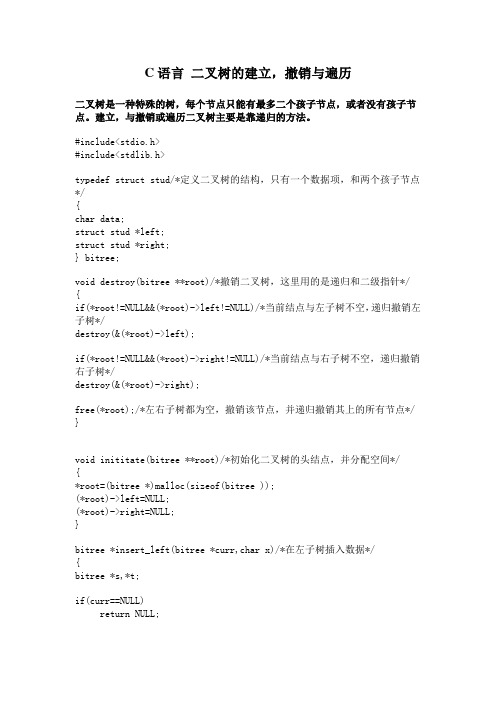
C语言二叉树的建立,撤销与遍历二叉树是一种特殊的树,每个节点只能有最多二个孩子节点,或者没有孩子节点。
建立,与撤销或遍历二叉树主要是靠递归的方法。
#include<stdio.h>#include<stdlib.h>typedef struct stud/*定义二叉树的结构,只有一个数据项,和两个孩子节点*/{char data;struct stud *left;struct stud *right;} bitree;void destroy(bitree **root)/*撤销二叉树,这里用的是递归和二级指针*/ {if(*root!=NULL&&(*root)->left!=NULL)/*当前结点与左子树不空,递归撤销左子树*/destroy(&(*root)->left);if(*root!=NULL&&(*root)->right!=NULL)/*当前结点与右子树不空,递归撤销右子树*/destroy(&(*root)->right);free(*root);/*左右子树都为空,撤销该节点,并递归撤销其上的所有节点*/ }void inititate(bitree **root)/*初始化二叉树的头结点,并分配空间*/ {*root=(bitree *)malloc(sizeof(bitree ));(*root)->left=NULL;(*root)->right=NULL;}bitree *insert_left(bitree *curr,char x)/*在左子树插入数据*/{bitree *s,*t;if(curr==NULL)return NULL;t=curr->left;/*保存当前左子树的数据*/s=(bitree *)malloc(sizeof(bitree));s->data=x;s->left=t;/*新结点指向原来的左子树*/s->right=NULL;curr->left=s;/*原来的节点指向新结点*/return curr->left;}bitree *insert_right(bitree *curr,char x)/*在这个节点的右子树插入数据*/{bitree *s,*t;if(curr==NULL)return NULL;t=curr->right;s=(bitree *)malloc(sizeof(bitree));s->data=x;s->left=NULL;s->right=t;curr->right=s;return curr->right;}bitree *delete_left(bitree *curr)/*删除当前结点的左子树*/{if(curr!=NULL&&curr->left!=NULL)destroy(&curr->left);/*删除左子树本身及其以后的所有节点*/curr->left=NULL;return curr;}bitree *delete_right(bitree *curr)/*删除右子树*/{if(curr!=NULL&&curr->right!=NULL)destroy(&curr->right);curr->right=NULL;return curr;}void preorder(bitree *root)/*递归先序遍历根节点*/ {if(root!=NULL){printf("%c ",root->data);preorder( root->left);preorder( root->right);}}void midorder(bitree *root)/*递归中序遍历根节点*/ {if(root!=NULL){midorder( root->left);printf("%c ",root->data);midorder(root->right);}}void postorder(bitree *root))/*递归后序遍历根节点*/ {if(root!=NULL){postorder(root->left);postorder( root->right);printf("%c ",root->data);}}bitree *search(bitree *root,char x))/*递归某一数值*/ {bitree *find=NULL;if(root!=NULL){if(root->data==x)find=root;else{find=search (root->left,x);)/*在左子树查找*/ if(find==NULL))/*左子树没有找到的话*/find=search (root->right,x);/*右子树找*/}}return find;}void main(){bitree *root,*s,*p,*find;int i,j,k;char c='E';inititate(&root);p=insert_left(root,'A');p=insert_left(p,'B');p=insert_left(p,'D');p=insert_right(p,'G');p=insert_right(root->left,'C');insert_left(p,'E');insert_right(p,'F');printf("前序遍历为\n");preorder(root->left);printf("\n中序遍历为\n");midorder(root->left);printf("\n后序遍历为\n");postorder(root->left);find=search(root->left,c);if(find)printf("这个元素%c在二叉树中\n",c);elseprintf("这个元素%c不在二叉树中\n",c);printf("撤销根节点的左子树为\n");delete_left(root->left);printf("\n前序遍历为\n");preorder(root->left);printf("\n中序遍历为\n");midorder(root->left);printf("\n后序遍历为\n");postorder(root->left);printf("\n撤销根节点的右子树为\n"); delete_right(root->left);printf("前序遍历为\n");preorder(root->left);printf("\n中序遍历为\n");midorder(root->left);printf("\n后序遍历为\n");postorder(root->left);destroy(&root);}。
二叉树的建立和遍历的实验报告
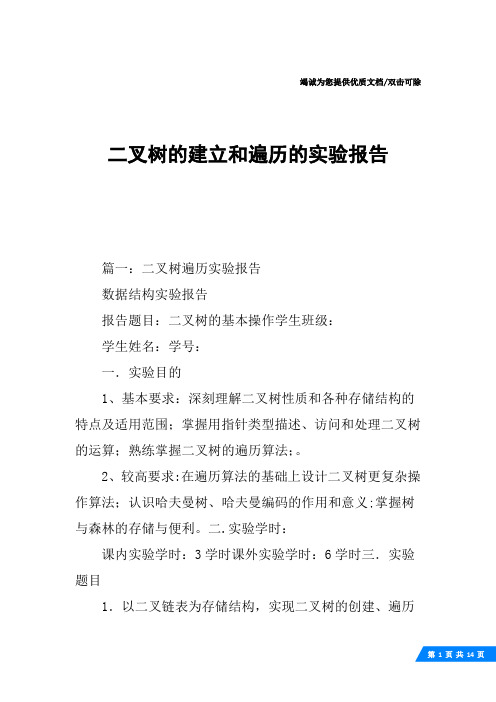
竭诚为您提供优质文档/双击可除二叉树的建立和遍历的实验报告篇一:二叉树遍历实验报告数据结构实验报告报告题目:二叉树的基本操作学生班级:学生姓名:学号:一.实验目的1、基本要求:深刻理解二叉树性质和各种存储结构的特点及适用范围;掌握用指针类型描述、访问和处理二叉树的运算;熟练掌握二叉树的遍历算法;。
2、较高要求:在遍历算法的基础上设计二叉树更复杂操作算法;认识哈夫曼树、哈夫曼编码的作用和意义;掌握树与森林的存储与便利。
二.实验学时:课内实验学时:3学时课外实验学时:6学时三.实验题目1.以二叉链表为存储结构,实现二叉树的创建、遍历(实验类型:验证型)1)问题描述:在主程序中设计一个简单的菜单,分别调用相应的函数功能:1…建立树2…前序遍历树3…中序遍历树4…后序遍历树5…求二叉树的高度6…求二叉树的叶子节点7…非递归中序遍历树0…结束2)实验要求:在程序中定义下述函数,并实现要求的函数功能:createbinTree(binTreestructnode*lchild,*rchild;}binTnode;元素类型:intcreatebinTree(binTreevoidpreorder(binTreevoidInorder(binTreevoidpostorder(binTreevoidInordern(binTreeintleaf(bi nTreeintpostTreeDepth(binTree2、编写算法实现二叉树的非递归中序遍历和求二叉树高度。
1)问题描述:实现二叉树的非递归中序遍历和求二叉树高度2)实验要求:以二叉链表作为存储结构3)实现过程:1、实现非递归中序遍历代码:voidcbiTree::Inordern(binTreeinttop=0;p=T;do{while(p!=nuLL){stack[top]=p;;top=top+1;p=p->lchild;};if(top>0){top=top-1;p=stack[top];printf("%3c",p->data);p=p->rchild;}}while(p!=nuLL||top!=0);}2、求二叉树高度:intcbiTree::postTreeDepth(binTreeif(T!=nuLL){l=postTreeDepth(T->lchild);r=postTreeDepth(T->rchil d);max=l>r?l:r;return(max+1);}elsereturn(0);}实验步骤:1)新建一个基于consoleApplication的工程,工程名称biTreeTest;2)新建一个类cbiTree二叉树类。
二叉树的建立和遍历实验报告
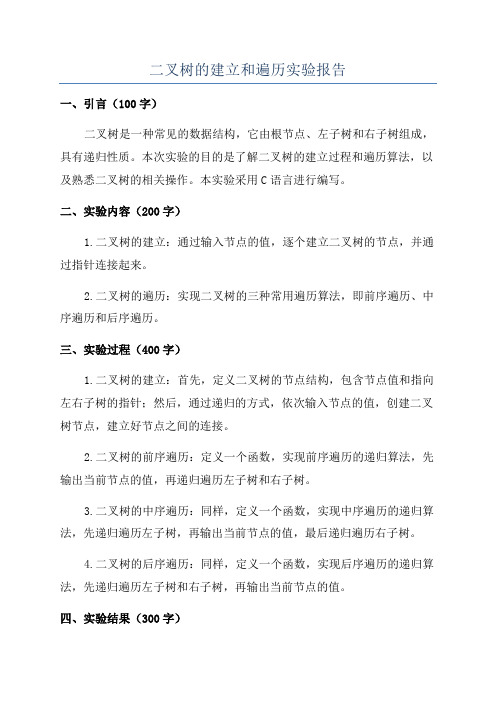
二叉树的建立和遍历实验报告一、引言(100字)二叉树是一种常见的数据结构,它由根节点、左子树和右子树组成,具有递归性质。
本次实验的目的是了解二叉树的建立过程和遍历算法,以及熟悉二叉树的相关操作。
本实验采用C语言进行编写。
二、实验内容(200字)1.二叉树的建立:通过输入节点的值,逐个建立二叉树的节点,并通过指针连接起来。
2.二叉树的遍历:实现二叉树的三种常用遍历算法,即前序遍历、中序遍历和后序遍历。
三、实验过程(400字)1.二叉树的建立:首先,定义二叉树的节点结构,包含节点值和指向左右子树的指针;然后,通过递归的方式,依次输入节点的值,创建二叉树节点,建立好节点之间的连接。
2.二叉树的前序遍历:定义一个函数,实现前序遍历的递归算法,先输出当前节点的值,再递归遍历左子树和右子树。
3.二叉树的中序遍历:同样,定义一个函数,实现中序遍历的递归算法,先递归遍历左子树,再输出当前节点的值,最后递归遍历右子树。
4.二叉树的后序遍历:同样,定义一个函数,实现后序遍历的递归算法,先递归遍历左子树和右子树,再输出当前节点的值。
四、实验结果(300字)通过实验,我成功建立了一个二叉树,并实现了三种遍历算法。
对于建立二叉树来说,只要按照递归的思路,先输入根节点的值,再分别输入左子树和右子树的值,即可依次建立好节点之间的连接。
建立好二叉树后,即可进行遍历操作。
在进行遍历算法的实现时,我首先定义了一个函数来进行递归遍历操作。
在每一次递归调用中,我首先判断当前节点是否为空,若为空则直接返回;若不为空,则按照特定的顺序进行遍历操作。
在前序遍历中,我先输出当前节点的值,再递归遍历左子树和右子树;在中序遍历中,我先递归遍历左子树,再输出当前节点的值,最后递归遍历右子树;在后序遍历中,我先递归遍历左子树和右子树,再输出当前节点的值。
通过运行程序,我成功进行了二叉树的建立和遍历,并得到了正确的结果。
可以看到,通过不同的遍历顺序,可以获得不同的遍历结果,这也是二叉树遍历算法的特性所在。
二叉树的建立实验报告
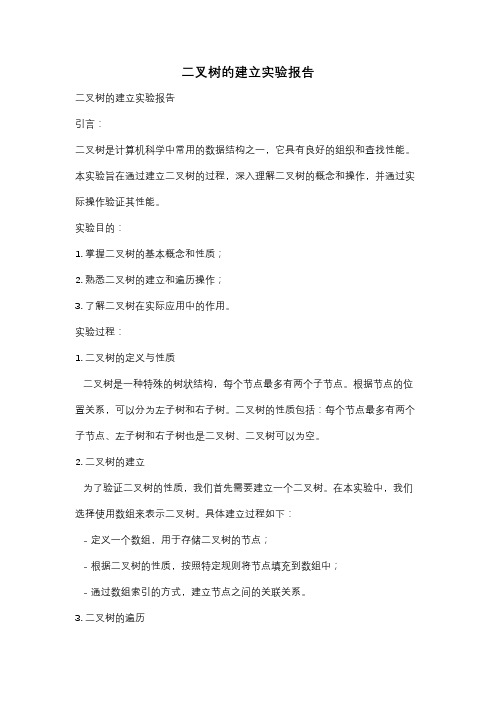
二叉树的建立实验报告二叉树的建立实验报告引言:二叉树是计算机科学中常用的数据结构之一,它具有良好的组织和查找性能。
本实验旨在通过建立二叉树的过程,深入理解二叉树的概念和操作,并通过实际操作验证其性能。
实验目的:1. 掌握二叉树的基本概念和性质;2. 熟悉二叉树的建立和遍历操作;3. 了解二叉树在实际应用中的作用。
实验过程:1. 二叉树的定义与性质二叉树是一种特殊的树状结构,每个节点最多有两个子节点。
根据节点的位置关系,可以分为左子树和右子树。
二叉树的性质包括:每个节点最多有两个子节点、左子树和右子树也是二叉树、二叉树可以为空。
2. 二叉树的建立为了验证二叉树的性质,我们首先需要建立一个二叉树。
在本实验中,我们选择使用数组来表示二叉树。
具体建立过程如下:- 定义一个数组,用于存储二叉树的节点;- 根据二叉树的性质,按照特定规则将节点填充到数组中;- 通过数组索引的方式,建立节点之间的关联关系。
3. 二叉树的遍历二叉树的遍历是指按照一定顺序访问二叉树中的节点。
常用的遍历方式包括前序遍历、中序遍历和后序遍历。
在本实验中,我们选择中序遍历来验证二叉树的建立是否正确。
中序遍历的过程如下:- 从根节点开始,递归地遍历左子树;- 访问当前节点;- 递归地遍历右子树。
4. 实验结果与分析经过建立和遍历操作,我们得到了一个完整的二叉树。
通过中序遍历,我们可以观察到二叉树节点的有序性,证明了二叉树的建立正确性。
此外,我们还可以通过其他遍历方式来验证二叉树的结构和性质。
实验总结:通过本次实验,我们深入了解了二叉树的概念和操作,并通过实际操作验证了二叉树的性质。
二叉树作为一种常用的数据结构,具有良好的组织和查找性能,在实际应用中发挥着重要的作用。
通过进一步学习和实践,我们可以更加熟练地运用二叉树,并将其应用于解决实际问题中。
参考文献:1. 《数据结构与算法分析》(C语言版),Mark Allen Weiss 著,机械工业出版社,2012年。
二叉树的建立与遍历(实验报告)
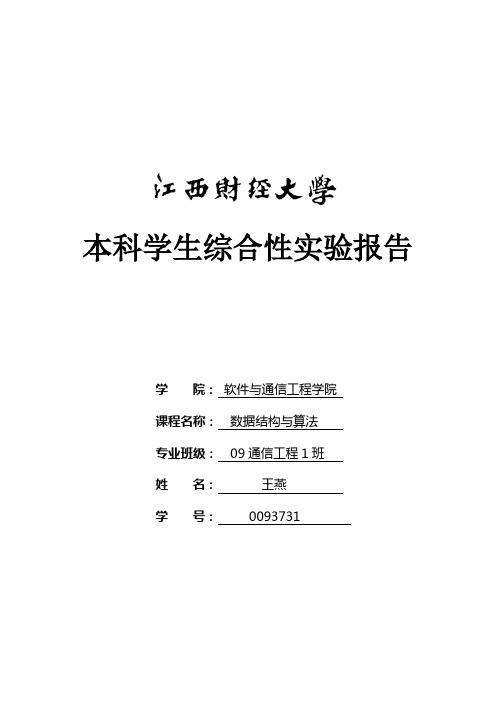
printf("%c",root->data);
}
}
//前序非递归遍历二叉树
void BiT_PreOrder(BiTNode *root)
{
BiTNode *p,*node[MAX];
int top=0;
p=root;
do{
while(p!=NULL)
}
}while(top>0 );
}
void Display(char str[])
{
printf("当前链表信息为:\n%s\n",str);
}
void main( )
{
char str[30];
BiTNode *root;
int k=1,flag;
while(k)
{
int i=0;
printf("\n\n\t\t\t二叉树的建立与遍历\n\n");
{
if(p->data!='*')
printf("%c",p->data);
node[top]=p;
top++;
p=p->LChild;
}
if(top>0)
{
top--;
p=node[top];
p=p->RChild;
}
}while(top>0 || p!=NULL);
}
//中序非递归遍历二叉树
void BiT_InOrder(BiTNode *root)
printf("\t\t\t1.先序建立二叉链表\n");
二叉树的遍历

T->rchild= CreatBiTree(); /*构造右子树*/ 扩展先序遍历序列
}
2021/2/21
return (T) ;}
A B Φ D Φ Φ C Φ 17Φ
T
T
T
ch=B
ch=Φ
Λ
T
T= Λ, Creat(T)
ch=A T
A
B creat(T L)
ΛB 返回
creat(T L)
creat(T R)
A
p=p->RChild;
}
2021/2/21
}
top
A
B
C
D
top
B
top
A
A
top
D
A
top
A
top
C
13
top
中序遍历二叉树的非递归算法:
A
void InOrder(BiTree T)
{ InitStack(&S); 相当于top=-1;
p=T;
B
C
while(p!=NULL | | !IsEmpty(S)) 相当于top==-1;
}
后序遍历二叉树的递归算法:
void PostOrder (BiTree T)
{ if(T!=NULL)
{ PostOrder (T->lchild);
PostOrder (T->rchild);
printf(T->data); }
2021/2/21
15
}
先序遍历二叉树的递归算法: void PreOder (BiTree T) { if(T! =NULL){ printf (T->data); PreOrder (T->lchild); PreOrder (T->rchild); } }
用C语言编写二叉树的建立与遍历
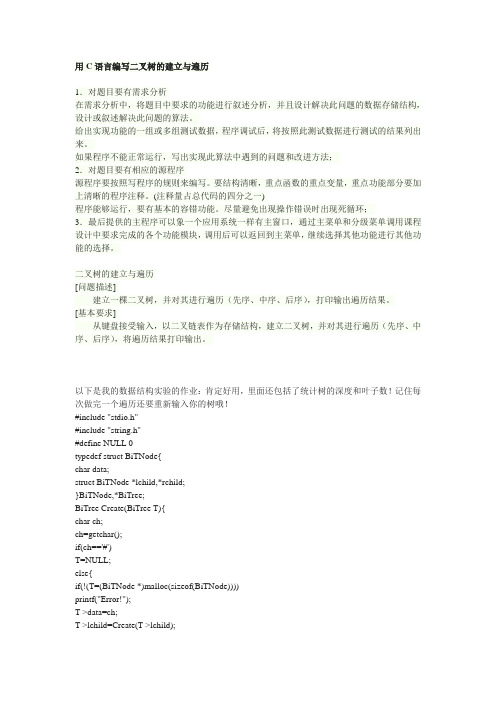
用C语言编写二叉树的建立与遍历1.对题目要有需求分析在需求分析中,将题目中要求的功能进行叙述分析,并且设计解决此问题的数据存储结构,设计或叙述解决此问题的算法。
给出实现功能的一组或多组测试数据,程序调试后,将按照此测试数据进行测试的结果列出来。
如果程序不能正常运行,写出实现此算法中遇到的问题和改进方法;2.对题目要有相应的源程序源程序要按照写程序的规则来编写。
要结构清晰,重点函数的重点变量,重点功能部分要加上清晰的程序注释。
(注释量占总代码的四分之一)程序能够运行,要有基本的容错功能。
尽量避免出现操作错误时出现死循环;3.最后提供的主程序可以象一个应用系统一样有主窗口,通过主菜单和分级菜单调用课程设计中要求完成的各个功能模块,调用后可以返回到主菜单,继续选择其他功能进行其他功能的选择。
二叉树的建立与遍历[问题描述]建立一棵二叉树,并对其进行遍历(先序、中序、后序),打印输出遍历结果。
[基本要求]从键盘接受输入,以二叉链表作为存储结构,建立二叉树,并对其进行遍历(先序、中序、后序),将遍历结果打印输出。
以下是我的数据结构实验的作业:肯定好用,里面还包括了统计树的深度和叶子数!记住每次做完一个遍历还要重新输入你的树哦!#include "stdio.h"#include "string.h"#define NULL 0typedef struct BiTNode{char data;struct BiTNode *lchild,*rchild;}BiTNode,*BiTree;BiTree Create(BiTree T){char ch;ch=getchar();if(ch=='#')T=NULL;else{if(!(T=(BiTNode *)malloc(sizeof(BiTNode))))printf("Error!");T->data=ch;T->lchild=Create(T->lchild);T->rchild=Create(T->rchild); }return T;}void Preorder(BiTree T){if(T){printf("%c",T->data); Preorder(T->lchild); Preorder(T->rchild);}}int Sumleaf(BiTree T){int sum=0,m,n;if(T){if((!T->lchild)&&(!T->rchild)) sum++;m=Sumleaf(T->lchild);sum+=m;n=Sumleaf(T->rchild);sum+=n;}return sum;}void zhongxu(BiTree T){if(T){zhongxu(T->lchild);printf("%c",T->data); zhongxu(T->rchild);}}void houxu(BiTree T){if(T){houxu(T->lchild);houxu(T->rchild);printf("%c",T->data);}}int Depth(BiTree T){int dep=0,depl,depr;if(!T) dep=0;else{depl=Depth(T->lchild);depr=Depth(T->rchild);dep=1+(depl>depr?depl:depr);}return dep;}main(){BiTree T;int sum,dep;T=Create(T);Preorder(T);printf("\n");zhongxu(T);printf("\n");houxu(T);printf("\n");sum=Sumleaf(T);printf("%d",sum);dep=Depth(T);printf("\n%d",dep);}在Turbo C的环境下,先按Ctrl+F9运行程序,此时就是建立二叉树的过程,例如输入序列ABC##DE#G##F###(其中的“#”表示空,并且输入过程中不要加回车,因为回车也有对应的ASCII码,是要算字符的,但是输入完之后可以按回车退出),然后再按ALT+F5显示用户界面,这时候就能够看到结果了。
- 1、下载文档前请自行甄别文档内容的完整性,平台不提供额外的编辑、内容补充、找答案等附加服务。
- 2、"仅部分预览"的文档,不可在线预览部分如存在完整性等问题,可反馈申请退款(可完整预览的文档不适用该条件!)。
- 3、如文档侵犯您的权益,请联系客服反馈,我们会尽快为您处理(人工客服工作时间:9:00-18:30)。
数据结构实验五课程数据结构实验名称二叉树的建立及遍历第页专业班级学号实验日期:年月日评分一、实验目的1.学会实现二叉树结点结构和对二叉树的基本操作。
2.掌握对二叉树每种操作的具体实现,学会利用递归方法编写对二叉树这种递归数据结构进行处理的算法。
二、实验要求1.认真阅读和掌握和本实验相关的教材容。
2.编写完整程序完成下面的实验容并上机运行。
3.整理并上交实验报告。
三、实验容1.编写程序任意输入二叉树的结点个数和结点值,构造一棵二叉树,采用三种递归遍历算法(前序、中序、后序)对这棵二叉树进行遍历并计算出二叉树的高度。
2 .编写程序生成下面所示的二叉树,并采用先序遍历的非递归算法对此二叉树进行遍历。
四、实验步骤(描述实验步骤及中间的结果或现象。
在实验中做了什么事情,怎么做的,发生的现象和中间结果)第一题#include "stdafx.h"#include"iostream.h"#include"stdlib.h"#include"stdio.h"#include<stack>using namespace std;#define NULL 0#define OK 1#define OVERFLOW -1typedef int Status;typedef struct node{char data;struct node *lchild;struct node *rchild;}*bitree;int k=0;int depth(bitree T)//树的高度{if(!T)return 0;else{int m=depth(T->lchild);int n=depth(T->rchild);return (m>n?m:n)+1;}}//先序,中序建树struct node *create(char *pre,char *ord,int n){struct node * T;int m;T=NULL;if(n<=0){return NULL;}else{m=0;T=new(struct node);T->data=*pre;T->lchild=T->rchild=NULL;while(ord[m]!=*pre)m++;T->lchild=create(pre+1,ord,m);T->rchild=create (pre+m+1,ord+m+1,n-m-1);return T;}}//中序递归遍历void inorder(struct node *T) {if(!T)return;else{inorder(T->lchild );cout<<T->data;inorder(T->rchild );}}void inpre(struct node *T){if(!T)return;else{cout<<T->data;inpre(T->lchild );inpre(T->rchild );}}void postorder(struct node *T) {if(!T)return;else{postorder (T->lchild );postorder (T->rchild );cout<<T->data;}}//先序非递归遍历void inpre1(struct node *T) {struct node *p;struct node *stack[20];int top=0;p=T;cout<<"非递归先序";while(p||top!=0){while (p){stack[top++]=p;cout<<p->data;p=p->lchild;}p=stack[--top];p=p->rchild ;}}//中序非递归遍历void inorder1(struct node *T) {struct node *p;struct node *stack[20];int top=0;p=T;cout<<"非递归中序";while(p||top!=0){while (p){stack[top++]=p;p=p->lchild ;}p=stack[--top];cout<<p->data;p=p->rchild ;}}//主函数int main(){bitree T;char pre[30],ord[30];int n,m;gets(pre);gets(ord);n=strlen(pre);T=create(pre,ord,n);inpre(T);cout<<endl;postorder (T);cout<<endl;inorder(T);cout<<endl;inpre1(T);cout<<endl;inorder1(T);cout<<endl;m=depth(T);cout<<"二叉树高度为:"<<m<<endl;return 0;}第二题:#include "stdafx.h"#include"iostream.h"#include"stdlib.h"#include"stdio.h"#include<stack>using namespace std;#define NULL 0#define OK 1#define OVERFLOW -1typedef int Status;typedef struct node{char data;struct node *lchild;struct node *rchild;}*bitree;Status Create(bitree &T) //按先序次序输入二叉树中结点的值,!表示空树{char e;cout<<"输入树的元素:"<<endl;cin>>e;if(e=='!') T=NULL;else{if(!(T=(node *)malloc(sizeof(node))))exit (OVERFLOW);T->data=e;Create(T->lchild);Create(T->rchild);}return OK;}//先序非递归遍历void inpre(struct node *T){struct node *p;struct node *stack[20];int top=0;p=T;cout<<"非递归先序";while(p||top!=0){while (p){stack[top++]=p;cout<<p->data;p=p->lchild;}p=stack[--top];p=p->rchild ;}}//主函数int main(){bitree T;Create(T);cout<<"输出的元素为:"<<endl;inpre(T);return 0;}五实验结果第一题:输入先序为-+a*b%cd/ef 输入后序为a+b*c%d-e/f 得出结果:输入先序为abcd输入后序为bacd得出结果:第二题:六实验总结1 为什么头文件只用#include <iostream> using namespace std;不行,要把所写到的程序中所包含的头文件头写进去。
于是就在想,反正以后不管这些头文件有没用到头写进去,省得一大堆麻烦。
2 用先序建树的时候虽然只要输入一个字符串,但是要判断空树的情况。
比较麻烦。
我个人觉得用先序与中序联合建树比较简单。
因为这样只要输入先序与中序就可以建树了。
3 对于三种遍历的过程,要是用递归写的就根据书上所给出的遍历步骤做稍微的调整就好了。
至于非递归的三种遍历,中序最为简单,用一个栈就可以完成了,思路是边进栈边收索左孩子,直到左孩子为空的时候才开始进行出栈输出再收索右孩子的操作。
而非递归的先序遍历基本可以和中序一样,建立一个队列,在进栈的时候队列也进同样的元素,但是不与栈一起出栈。
而是在最后进栈出栈结束的时候,对队列进行出队列操作即可。
4 二叉树对于进行表达式的前缀,中缀和后缀的表示有明显的优势,既方便,又容易理解。
其先序,中序和后序分别对应这表达式的前缀,中缀和后缀。
5 在建树与进行树的遍历的时候一定要理解其建树与遍历的整个过程。
不然就会连为什么这样做都不知道。
在遍历树的时候最常用到的就是栈的结构了(非递归)。
七:思考与提高1.如何计算二叉链表存储的二叉树中度数为1的结点数?答:int countleaf(bitree t,int count){if(!(t->lchild) &&(t->rchild)count++;else if ((t->lchild)&&!(t->rchild))count++;countleaf(t->lchild);countleaf(t->rchild);return count;}2.已知有—棵以二叉链表存储的二叉树,root指向根结点,p指向二叉树中任一结点,如何求从根结点到p所指结点之间的路径?答:void foundp(bitree t){if(t==p){Push(s, t->data);Pop(s, t->data);}foundp(t->lchild);foundp(t->rchid);}。
